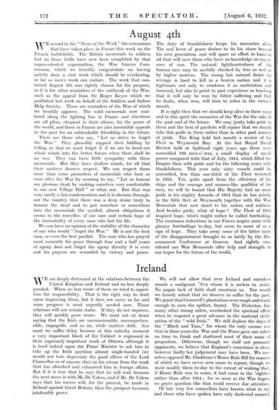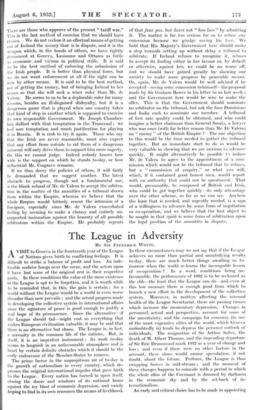Ireland
WE are deeply distressed at the relations between the United Kingdom and Ireland and no less deeply puzzled. When we last wrote of them we tried to appor- tion the responsibility. That is the right way to start upon improving them, but it does not carry us far and some progress is most urgently needed now. Those relations will not remain static. If they do not improve, they will quickly grow worse. We must not sit down saying that the Irish are unconscionable, uncomprehen- sible, impayable, and so on, while matters drift. Nor must we suffer delay because at this unlucky moment a very important block of the Cabinet is engrossed in their supremely important work at Ottawa, although it is hard indeed upon the Prime Minister to ask him to take up the Irish question almost single-handed (we would not here depreciate the good offices of the Lord Chancellor or of anyone else) on his return from the work that has absorbed and exhausted him in foreign affairs. But if it is true that he says that he will wait because the next move is with Mr. De Valera, and if Mr. De Valera says that his moves will, for the present, be made in Ireland against Great Britain, then the prospect becomes intolerably grave. We will not allow that over Ireland and ourselves stands a malignant 'Ail/ whom it is useless to resist. No pagan lack of faith shall constrain us. Nor would we tamely admit that we deserve to suffer for the past. We grant that Cromwell's plantations were rough and ready enough to earn the epithet, brutal. The Protector, like many other strong rulers, overlooked the spiritual effect when he imposed a great advance in the material civili- zation of the "wild Irish." We still deplore the days of the "Black and Tans," for whom the only excuse was that in those years the War and the Peace gave our rulers no time to think and shattered most of their sense of proportion. Otherwise, though we shall not persuade opponents, we believe that England's conscience is clear, however faulty her judgement may have been. We our- selves opposed Mr. Gladstone's Home Rule Bill for reasons of which we have never seen cause to repent, though we must modify them to-day to the extent of wishing that, if Home Rule was to come, it had come in the 'eighties rather than after 1914; for so soon as the War began, no grave question like that could receive due attention.
Of late very few counsellors have known what to say and those who have spoken have only darkened counsel. There are those who approve of the present "tariff war." This is the last method of coercion that we should have chosen. We do not reckon it an effectual means of getting out of Ireland the money that is in dispute, and it is the weapon which, in the hands of others, we have rightly denounced at Geneva, Lausanne and Ottawa as futile in economic and vicious in political strife. It is said to be the best method of enforcing the submission of the Irish people. It is better than physical force, but we do not want enforcement at all if the right can be won by other means. It is said to be the best method, not of getting the money, but of bringing Ireland to her senses so that she will seek a wiser ruler than Mr. de Valera. He seems to us to be a deplorable ruler for many reasons, besides an ill-disguised disloyalty, but it is a dangerous game that is played when one country takes that kind of step in another which is supposed to exercise its own responsible Government. Mr. Joseph Chamber- lain dallied with that temptation in the Transvaal ; we had sore temptation and much justification for playing it in Russia. It is rash to try it again. Those who say that the Irish are never reasonable, must also expect that any effort from outside to rid them of a dangerous autocrat will only drive them to support him more eagerly. On this we cannot judge. Indeed nobody knows how wide is the support on which he stands to-day, or how influential Mr. Cosgrave remains.
If we thus decry the policies of others, it will fairly be demanded that we suggest another. The latest obstacle to progress, though not a fundamental one, is the blank refusal of Mr. de Valera to accept the arbitra- tion in the matter of the annuities of a tribunal drawn from within the Empire, whereas we believe that the whole Empire would bitterly resent the intrusion of a foreigner, especially since Mr. de Valera exacerbated feeling by seeming to make a clumsy and entirely un- supported insinuation against the honesty of all possible arbitrators within the Empire. He probably repents of that faux pas, but dares not "lose face" by admitting it. The matter is far too serious for us to refuse any concession because we grudge saving his face. We hold that His Majesty's Government here should make a step towards setting up without delay a tribunal to arbitrate. If Ireland refuses to recognize it, refuses to accept its finding either in her favour or, by default or otherwise, against her, we could be no worse off, and we should have gained greatly by showing our anxiety to make some progress by peaceable means. Or, again, Mr. de Valera would be well advised if he accepted—seeing some concession to himself—the proposal made by Sir Graham Bower in his letter to us last week ; and the Government here would be wise to make the offer. This is that the Government should nominate no arbitrator on the tribunal, but ask the four Dominions and India each to nominate one member. A tribunal of first rate quality could be obtained, and who could imagine a better chairman than General Smuts, a lawyer who was once (with far better reason than Mr. De Valera) an " enemy " of the British Empire The one objection to this would be the time needed to gather the tribunal together. But an immediate start to do so would be very valuable in showing that we are anxious to advance quickly. It might alternatively be possible tc) induce Mr. de Valera to agree to the appointment of a corn- mission which would not be the tribunal that he refuses, but a "commission of enquiry," or what you will, which, if it contained good honest men, would report with an authority that could not be questioned. That would, presumably, be composed of British and Irish, who could be got together quickly—its only advantage over the other scheme, so far as we can see. Anyhow the least that is needed, and urgently needed, is a sign of a willingness to advance by some form of negotiation or co-operation, and we believe that the first object to be sought in that spirit is some form of arbitration upon the legal position of the annuities in dispute.



























 Previous page
Previous page